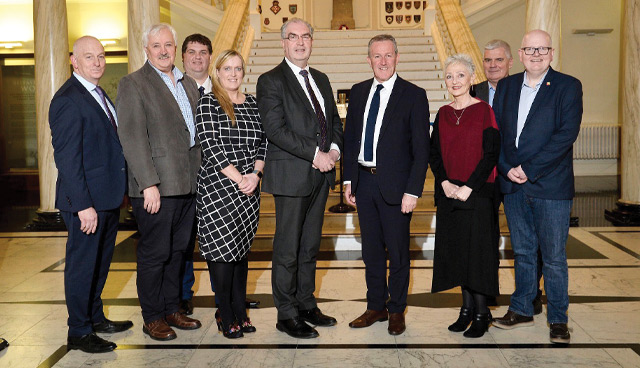Social Enterprise vital to an inclusive economy

Finance Minister Conor Murphy MLA, Chair of the Procurement Board, discusses the transition to place social enterprise at the heart of Northern Ireland’s economic strategy.
Last month I was delighted to attend a Social Enterprise NI event in Belfast City Hall. The event brought together enterprises which operate in very different markets, but which share a desire to trade ethically and reinvest their profits for the good of the community. Businesses such as Loaf Catering, incredABLE, and Clear Water, are living proof that social enterprises can be commercially successful, at the same time as delivering additional social benefits.
Despite this, social enterprise is sometimes regarded as peripheral to the ‘real’ economy. If we are to build an inclusive economy then social enterprise must be properly valued and supported alongside the public and private sectors, and placed at the heart of economic strategy. With their grounding in ethical values and community benefit they have a particularly significant role to play in tackling economic inactivity, promoting good health, addressing low-paid and insecure work, and achieving a just transition to a zero carbon economy.
My Executive colleague, the Economy Minister Diane Dodds funds Social Enterprise NI to promote the growth of the sector and leads on social enterprise policy. There are a number of ways in which the Finance Department can assist. Building on the consultation carried out by the National Lottery Community Fund, my department will soon produce an action plan to disburse over £16 million available from dormant bank and building society accounts. This fund will help increase the capacity, resilience and sustainability of social enterprises.
As Finance Minister I lead on procurement policy and chair the Procurement Board. One quarter of the Executive’s spending is procured, making it a hugely important buyer of goods, services, and construction work.
In the remaining two years of this mandate I intend to deliver legislation that requires social impacts to be factored in to procurement exercises. Scoring for social value alongside cost and quality will provide for more holistic assessments of value for money. This will have the effect of levelling the playing field for all types of businesses including small businesses, voluntary and community sector organisations and social enterprises.

The development of social enterprise is absolutely essential to the creation of an inclusive economy.
I also want to encourage greater use of provisions in procurement law which allow government to reserve contracts. Regulation 20 allows contracts to be reserved for companies with 30 per cent of their employees disabled or disadvantaged. Regulation 77 allows contracts for particular services to be reserved for companies that, among other conditions, have a public service mission, are owned by their employees, and have not been awarded a contract for services in the last three years. My officials are exploring opportunities to use these regulations by matching what qualifying social enterprises can supply with what the public sector buys.
The Communities Minister Deirdre Hargey and I are working together to improve the Community Asset Transfer policy, which allows for public sector assets to be transferred to social enterprises. Strengthening their asset base should enable social enterprises to generate more revenue, employ more people, and deliver more services to the communities they serve.
Potential improvements to the existing policy include ensuring public bodies publish a register of all their assets, so that enterprises don’t have to wait until government declares that an asset is surplus to requirements. The development of a central register of all public assets is underway and will be publicly available on the OpenDataNI website. The first set of data will be published shortly.
The Communities Minister and I are looking at whether the Community Asset Transfer policy could be extended to apply to underutilised assets, not just those deemed surplus. We are also discussing how to better support enterprises to take on the onerous responsibility of owning and managing assets.
All these policies will be taken forward with the insight and expertise of social enterprises. The Department for the Economy leads a cross-departmental group which includes departments’ arm’s length bodies and local councils. Taking forward social value initiatives and co-design will continue as I implement my policy agenda for social enterprise.
The development of social enterprise is absolutely essential to the creation of an inclusive economy. Fortunately, the infrastructure of the sector is already strong with an expert social finance organisation in the form of UCIT, and influential representative groups such as Social Enterprise NI and NICVA. I’m confident that the release of dormant account funds, social value legislation, more use of reserved contracts, and an improved Community Asset Transfer policy, can build on this great work.





